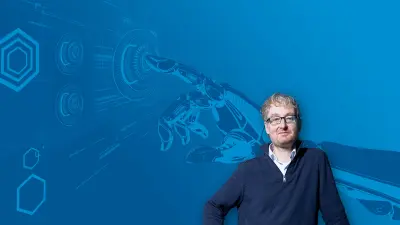“Artificial intelligence can learn anything that humans can learn”
In dialogue with the Professor of Amsterdam University

2018-03-12
Computers that make decisions and learn from their mistakes — Deep Learning is the basis for intelligent machines and products. Bosch and the University of Amsterdam are working together closely in this field and have founded the research collaboration DeltaLab (Deep Learning Technologies Amsterdam) to promote the regular exchange of expertise and sharing of knowledge. Can Deep Learning revolutionize our society?
What makes Deep Learning so fascinating?
Deep Learning has long since ceased to be restricted to the academic context; it is finding its way into our reality. One example is smartphones: The user talks to them and they understand what is said.
Vehicles, too, suddenly act autonomously and learn from their environment. There are almost endless possibilities for the application of deep learning: There are no limits to creativity.
Deep Learning and machine learning — what’s the difference?
Machine learning makes machines intelligent by enabling them to learn from “Big Data sets”. Humans are actively involved here in the learning and analysis process. Deep Learning is a subfield of machine learning, but it is inspired by the simulation of human neuronal networks. Like living beings, intelligent systems are capable of learning from information such as images or sounds.
Artificial intelligence (AI) repeatedly connects new contents with everything it has learnt previously. This means that it makes decisions – and autonomously reflects on them. If the system makes a mistake, it will act differently next time.
“I never ask myself whether something is feasible — I only ask when. AI can learn anything which is possible for a human — after all, our brain is also a kind of computer.”
What does big data mean?
As the name says, big data refers to everything connected with large amounts of data. How can data be quickly prepared and processed? Where should it be stored? How can machines learn from the data? Just about everyone who is involved with AI programming faces these challenges – and has to overcome them.
Big data is to AI what fuel is to engines: If the tank is empty, the engine comes to a halt. The strongest concepts are worthless as long as there is no data available to get them off the ground.
AI and the internet — equally significant innovations?
Similarly to the Industrial Revolution, or indeed internet access, AI can revolutionize the way in which the world and the economy work. It is difficult to say what we can achieve using current technologies and where new ideas are still needed.
The potential exists, at any rate. To take the next big step, it may be necessary for researchers to think even further outside the box.
“The prices of autonomous vehicles will soon fall. However, it may be some time before the vehicles are able to cope with unknown, difficult traffic situations, such as the bicycle chaos in Amsterdam.”
Will computers replace humans?
We are far away from that point. Certainly, there will be things about AI which will need careful thought. But the emergence of this “Terminator” scenario is less probable than the possibility of serious problems involving misuse of data.
Or that people with high incomes will have chips implanted that optimize their mental capacity, giving the “rich” even more economic advantages. Countless such scenarios are conceivable. But nobody can predict the future.
Max Welling, Professor at Amsterdam University

Max Welling trained with Geoffrey Hinton, one of the founding researchers at Google’s Deep Learning department. He now researches and teaches at Amsterdam University, where he has a professorship in Machine Learning. In April 2017, Welling’s Amsterdam team and Bosch started their research collaboration, DeltaLab, to enable researchers to exchange expertise about Deep Learning. The results are implemented in the form of applications and products.
Summary
Deep Learning means that machines — like people — can learn from experience. The method is inspired by the simulation of neural networks and has the potential to change the world and the economy dramatically.